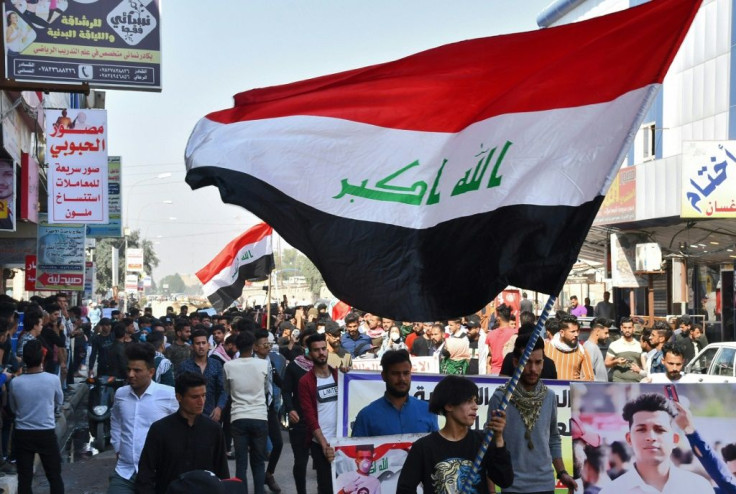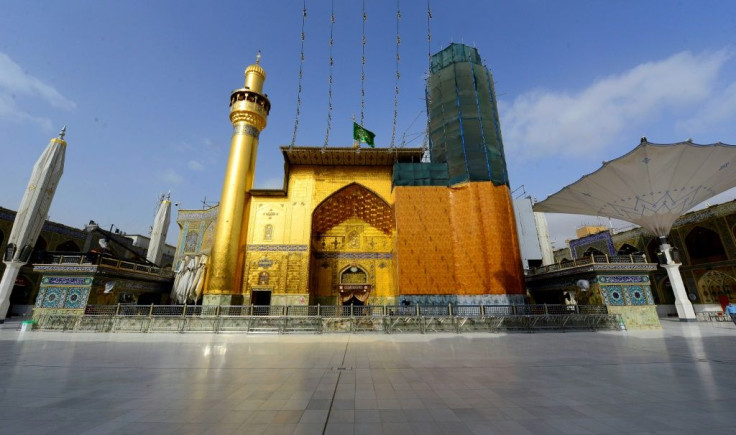Iraq Faces Financial Calamity After Crude Crash

Between plummeting oil prices, political deadlock and reduced global appetite for a bail-out, Iraq is on the cusp of financial calamity that could force austerity measures and renew anti-government protests.
But officials appear remarkably optimistic, a view experts described as being "in denial" given forecast oil crashes would cost Iraq two-thirds of its net income this year.
Brent oil prices tanked this week to $26 per barrel, the lowest since 2003, following a hit to global oil demand from the novel coronavirus outbreak and a price war between major producers Saudi Arabia and Russia.
Iraq, which relies on oil revenues for more than 90 percent of its revenues, was set to face "vast economic pressures," said Fatih Birol, head of the International Energy Agency (IEA).
Iraq is the second-biggest crude producer in the OPEC oil cartel, and typically exports around 3.5 million barrels per day. Its draft 2020 budget was based on a projected price of $56 per barrel.
With prices slashed, Iraq's net income would drop 65 percent in 2020 compared to last year, incurring a monthly deficit of $4 billion just to pay salaries and keep the government running.
"In the current crisis, Iraq's oil revenues will struggle to break $2.5 billion per month," said Birol, appealing to Iraqi officials to find "urgent solutions."
That projection was based on a price of $30 per barrel before the latest drop, making it a bullish outlook.
Top officials told AFP the finance and oil ministries, Central Bank of Iraq (CBI) and state-owned banks were exploring ways to trim costs and find financing.
"There is some anxiety, but it's not acute," CBI governor Ali Allaq told AFP.
"Oil prices will not stay at this level. We don't expect them to go up a lot, but enough to secure the required amount," he said.

Still, Allaq said, officials were closely reviewing the 2020 draft budget, one of Iraq's largest ever at around 164 trillion Iraqi dinar, or about $137 billion.
More than 75 percent had been set aside for salaries and other running costs, with the rest spent on capital investments.
Salaries jumped from $36 billion in 2019 to $47 billion for 2020, after 500,000 new employees were hired to appease months of anti-government rallies.
The government employs about four million Iraqis, and pays pensions to three million and social welfare to another one million.
"Based on our preliminary indications, we will be able to cover the external debt and the salaries," Allaq said, while trimming subsidies and services that were not "economically efficient."

But slashing any benefits at a time of a global economic contraction could send more people back into the streets.
Other options include recapturing "trillions" of dinar from accounts in state-owned banks where ministries had stashed years of surplus funds, as well as issuing bonds to the public and rescheduling internal debt payments, Allaq said.
New talks were also underway with the International Monetary Fund, but with an unpassed budget and no new government, they may not go far, he told AFP.
The government has no plans to devalue the currency, take out new external loans or halt payments to international oil companies, which amount to about $1 billion per month.
Allaq was hopeful that the pressures could push the government to introduce long-awaited financial reforms.
"What doesn't kill you makes you stronger," he said.
Some officials acknowledge privately that they do not share Allaq's optimism.
One senior Iraqi adviser described the situation as a "dangerous crisis."
Another said it would be impossible to trim the budget in a country ranked by Transparency International as the 16th most corrupt in the world.
"Some ministers are against cuts because it would hack at their patronage networks," the adviser said.
The official added that the government was assuming oil prices would normalise within two months, a forecast not shared by the IEA.
"Sticking your head in the sand is not a policy," said Ahmed Tabaqchali of the Iraq-based Institute of Regional and International Studies.
Although Iraq faced price crashes in 2014 and 2016, it did not see the current drastic drop in global demand -- particularly from virus-hit China, Iraq's main importer.
And leaning on the international community is less viable than in 2014, when world powers were keen to help Iraq fight the Islamic State group.
Iraq may have to dip into reserves worth about $60 billion to cover the deficit, Tabaqchali said, but would inevitably have to slash salaries and perhaps even borrow internationally.
Even if markets eventually stabilise, Iraqi crude would struggle to compete with the glut produced by Saudi Arabia.
"There are painful readjustments that we need to do now, not for our grandchildren and people that you cannot see," said Tabaqchali.
© Copyright AFP 2024. All rights reserved.




















